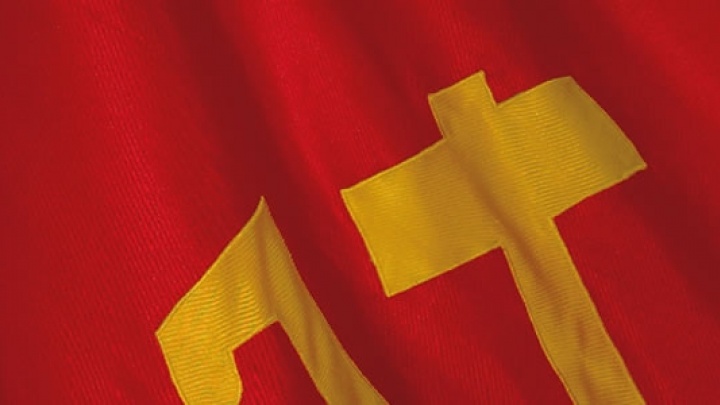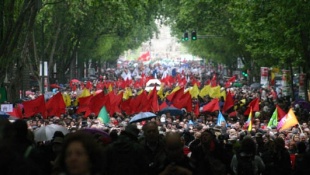Translated "Avante!" article by Albano Nunes, Member of the PCP Secretariat of the CC
The silence undergone by the daily media on the PCP’s great rally against the pact of aggression, in Oporto, on the 12th May last, at the same time a so-called action of “ people in anger”, was worthy of whole pages, is a particularly serious case of mystification, but is easily explained. The organized struggle silencing and the promotion of all that might help to confound and put off the class struggle and contribute for the weakening of the anti-monopolist front, can only but favour the great capital and delay the necessary changes, both in Portugal or in any other country. That is the purpose of international production and promotion of symbols, slogans , dates, movements and even “world” leaders, such as currently has happened with the “ indignation Spring”.
The issue is serious and has backgrounds which must not be forgotten. Such as the case of the well-known “anti/alter globalization” movements, at its time, presented as the most modern internationalism expression; the thesis that blockiest and tutti quanti angerly defended ( and defend) in which, at a “globalization” time , the struggle within the national boundary lost its purpose and the social change space became the European level, therefore justifying its rendering unto the European Union monopolies disguised in “ left-wing Europeism”; the campaigns with the objective of replacing the working class historical role by a “new revolutionary subject”, as in “ May 68” or, more recently, with the “movement of movements” or the Negri “crowds”; the attempts to drive away from the FSM revolutionary parties and forces and open up space to reformism and social-democracy, that even Mario Soares appeared , strongly mediatised, holding up “ alter globalization ”banners; the developed illusions round the Attac and the ambitious blockiest manoeuvres to orchestrate the “Portuguese Social Forum” and impose the popular movement an monitored agenda from the abroad; the promotion, together with “internationalism” cynical disguises, from the European left-wing party” of which the PCP always delimited itself owing to its supranational nature and the umbilical liaison to the European Union, but that the Left Block /BE rushed to become integrated.
Yesterday, the “anti /alter globalization”, currently the “ indignation Spring” and other international constructions, more or less social-democratizing, constructions holding several clothings, but always holding the same purpose of whitening capitalism, recognizing and even endearing the right to indignation, but in order to recover it and delimit it within the system. And at the same time it silences and fights the organized struggle, nurtures spontaneity and the inconsequent and frustrate moving of the mass struggle potential; denying the class struggle reality and fights, with all means syndicalism and the class party; deviating, unto an anarchy individualism and reformist bed, real discontentment and indignation feelings which remain temporarily alienated from the popular movement.
The national and international situation complex framework contains great interrogations and uncertainties concerning its evolution within the short and medium term. But life confirms regarding the popular struggles’ own growth throughout the world, that Mat 1st celebrations were a magnificent expression , that many dangers coexist together with great possibilities of progressive and revolutionary change. In reality, for Portugal and the world, the path for an alternative is hard, and that the necessary turning point is out of one’s range of view. It will emerge from the struggle itself. Persistent and organized, combining each country’s struggle with the solidarity and the convergent action at international level, in the defence of exact and immediate workers’ and peoples’ interests, always with socialism at the horizon.
From that path, the dominant class strives to deviate the masses.


